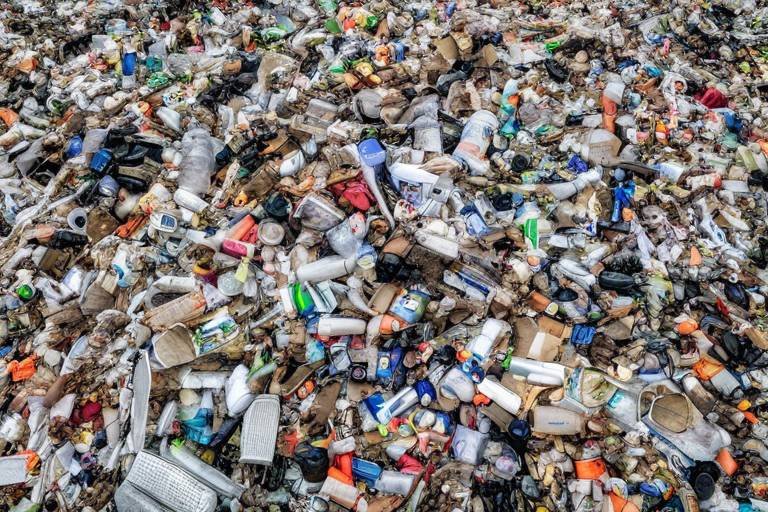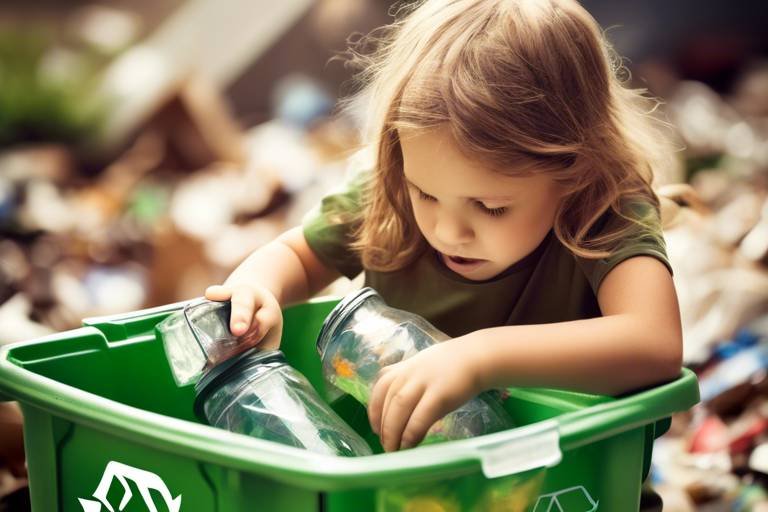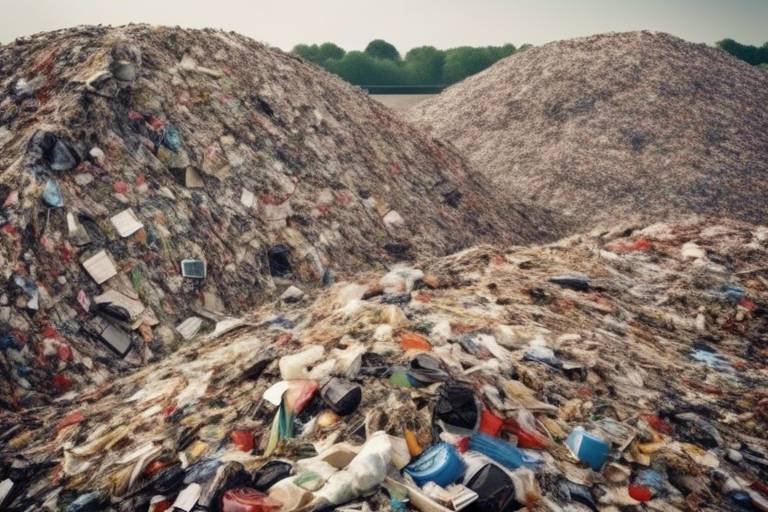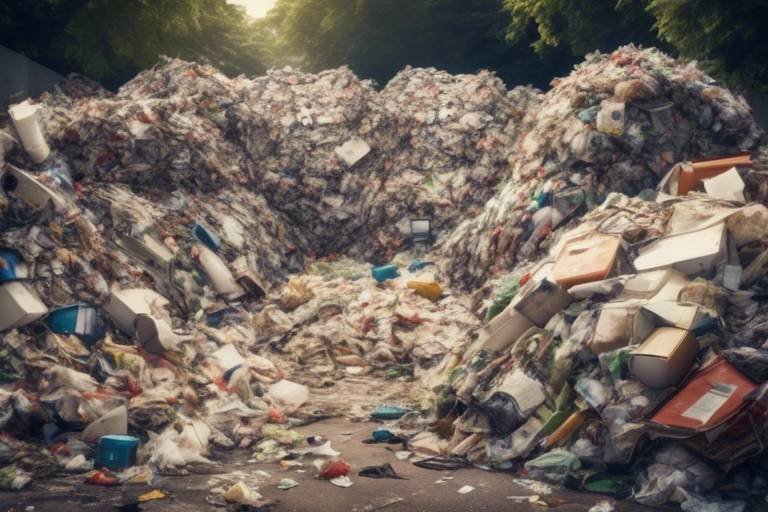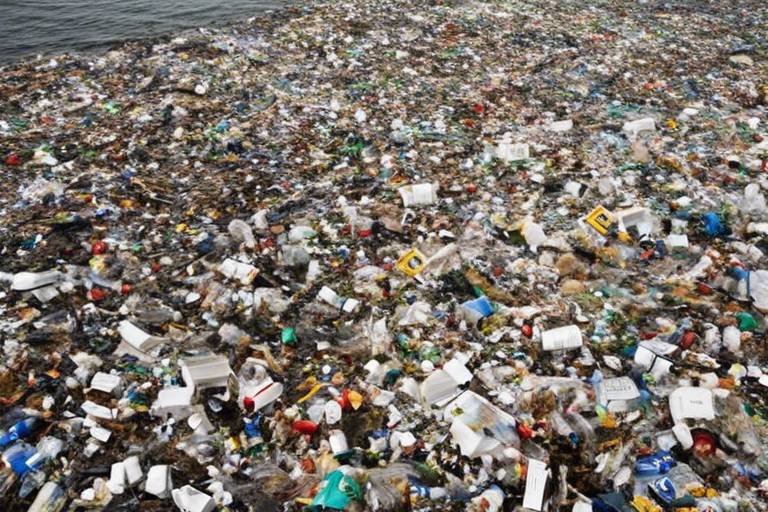Can we Achieve Zero Waste to Landfills?
The idea of achieving zero waste to landfills may sound like an ambitious dream, but it's more attainable than many think. Imagine a world where every piece of waste is either reused, recycled, or composted, leaving no trace in a landfill. This concept isn't just a fantasy; it's a viable goal that communities and organizations can strive for. By understanding the principles behind zero waste and implementing effective strategies, we can significantly reduce our environmental footprint and promote sustainability.
At its core, zero waste is not merely about minimizing waste; it's a comprehensive philosophy that encourages us to rethink our consumption habits. It challenges the traditional linear model of "take, make, dispose" and promotes a circular economy where resources are kept in use for as long as possible. This transition requires a collective effort from individuals, businesses, and governments, making it essential for everyone to play a part in this transformative journey.
So, how can we make this vision a reality? The answer lies in a combination of education, community involvement, and strategic planning. It's about fostering a culture of sustainability where everyone understands the importance of reducing waste and is equipped with the tools to do so. From simple lifestyle changes to comprehensive waste management strategies, there are numerous ways to contribute to this cause. The journey to zero waste isn't just about reducing what we throw away; it's about redefining our relationship with resources and the environment.
In our exploration of zero waste, we will delve into its benefits, including environmental protection, resource conservation, and economic advantages. We will also discuss practical strategies for implementation that can empower communities and organizations to take meaningful action. By embracing the zero waste philosophy, we not only protect our planet but also create healthier, more resilient communities.
- What is zero waste? Zero waste is a philosophy aimed at reducing waste to the point where no trash is sent to landfills, incinerators, or the ocean.
- Why is zero waste important? Achieving zero waste can significantly reduce environmental pollution, conserve natural resources, and promote sustainable practices.
- How can individuals contribute to zero waste? Individuals can reduce waste by reusing items, recycling, composting organic waste, and choosing products with minimal packaging.
- What role do businesses play in zero waste? Businesses can adopt sustainable practices, minimize waste in their operations, and promote recycling and composting among employees and customers.
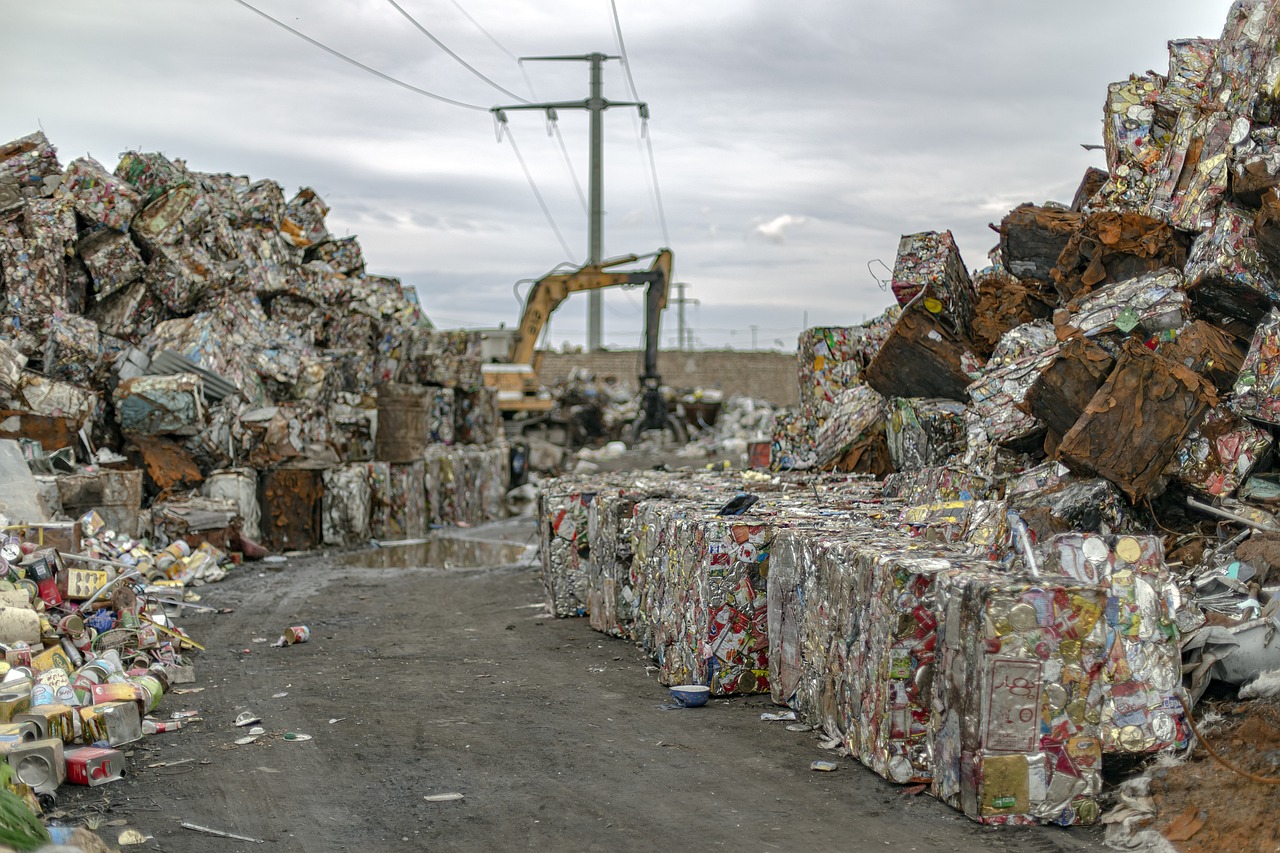
The Concept of Zero Waste
Understanding the principles of zero waste is crucial for implementing effective waste management strategies. At its core, the zero waste philosophy is about redesigning our systems to eliminate the concept of waste entirely. Imagine a world where every single item we use is either reused, recycled, or composted, leaving no trace behind in landfills. This vision is not merely a dream; it’s a call to action for communities and organizations alike. The significance of zero waste lies in its potential to transform our relationship with resources and consumption.
Zero waste isn't just about managing waste; it's about rethinking how we produce and consume. It encourages a circular economy where products are designed to last longer, be reused, and ultimately return to the earth safely. This means we need to shift our mindset from a linear model of 'take, make, dispose' to a more sustainable approach that values resource efficiency and environmental stewardship.
One of the key principles of zero waste is the 5Rs: Refuse, Reduce, Reuse, Recycle, and Rot. Each of these steps plays a vital role in minimizing waste:
- Refuse: Say no to unnecessary items, especially single-use plastics.
- Reduce: Cut down on what you consume and choose quality over quantity.
- Reuse: Find ways to repurpose items instead of discarding them.
- Recycle: Ensure materials are processed correctly to give them a new life.
- Rot: Compost organic waste to enrich the soil.
Implementing these principles requires a collective effort. It’s not just about individuals making changes in their homes but also about organizations and governments taking significant steps to create systems that support zero waste initiatives. Communities can thrive when everyone works together towards a common goal of sustainability. The journey toward zero waste begins with awareness and education, empowering individuals to make informed choices that positively impact the environment.
In conclusion, the concept of zero waste is more than a trend; it’s a necessary shift towards a sustainable future. By embracing this philosophy, we can protect our planet for future generations, ensuring that resources are available and ecosystems are preserved. The question remains: are we ready to take the first step towards a waste-free world?

Benefits of Achieving Zero Waste
Adopting a zero waste approach is not just a trend; it's a transformative movement that can significantly benefit our planet and communities. Imagine a world where our trash bins are nearly empty, where everything we consume is either recycled, composted, or reused. This is the vision of zero waste, and the benefits are profound. By minimizing waste, we can protect the environment, conserve valuable resources, and even save money. It’s a win-win situation!
One of the most compelling advantages of achieving zero waste is the positive environmental impact. Landfills are notorious for producing harmful greenhouse gases, such as methane, which contribute to climate change. By diverting waste from landfills, we can significantly reduce these emissions. Additionally, less waste means less pollution in our air and water, leading to healthier ecosystems. When we think about it, reducing waste is like giving Mother Nature a much-needed hug!
Moreover, adopting zero waste practices can lead to substantial economic advantages. Businesses that implement sustainable practices often see a decrease in operational costs. For instance, by reducing waste, companies can lower disposal fees and engage in resource recovery, which can lead to new revenue streams. It's not just about saving the planet; it's about saving dollars too! Furthermore, the transition to a zero waste economy can create new jobs in recycling and composting industries. Think of it as planting seeds for a greener economy that will flourish with innovation and opportunity.
Another crucial aspect is community health. Landfills can have detrimental effects on local communities, including air and water pollution, which can lead to various health issues. By reducing waste and promoting recycling and composting, we can improve the quality of air and water in our neighborhoods. Cleaner environments lead to healthier populations. It’s like trading a polluted landscape for a vibrant garden where everyone can thrive!
Additionally, zero waste practices encourage resource conservation. When we focus on reusing materials and recycling, we reduce the need for new production, which often depletes natural resources. For example, recycling aluminum saves 95% of the energy required to produce new aluminum from raw materials. It's a staggering statistic that highlights how resource-efficient our practices can be. By embracing zero waste, we are not just conserving resources for today; we are ensuring that future generations will have access to the materials they need.
In summary, the benefits of achieving zero waste are vast and varied. From enhancing environmental health to boosting economic growth and improving community well-being, the advantages are clear. It’s time to shift our perspective and realize that achieving zero waste is not just an aspiration; it’s a necessity for a sustainable future. When we come together as individuals, communities, and organizations, we can create a lasting impact that resonates far beyond our immediate surroundings.
Q1: What is zero waste?
A: Zero waste is a philosophy that encourages the redesign of resource life cycles so that all products are reused. The goal is to eliminate waste, rather than manage it.
Q2: How can individuals contribute to zero waste?
A: Individuals can contribute by reducing consumption, reusing items, recycling properly, and composting organic waste. Small changes in daily habits can lead to significant impacts.
Q3: What are some examples of zero waste practices?
A: Examples include using reusable bags, containers, and water bottles, buying in bulk to reduce packaging waste, and participating in local recycling and composting programs.
Q4: Are there any economic benefits to zero waste?
A: Yes! Implementing zero waste practices can lead to cost savings for businesses, job creation in recycling and composting sectors, and overall economic growth through sustainable practices.
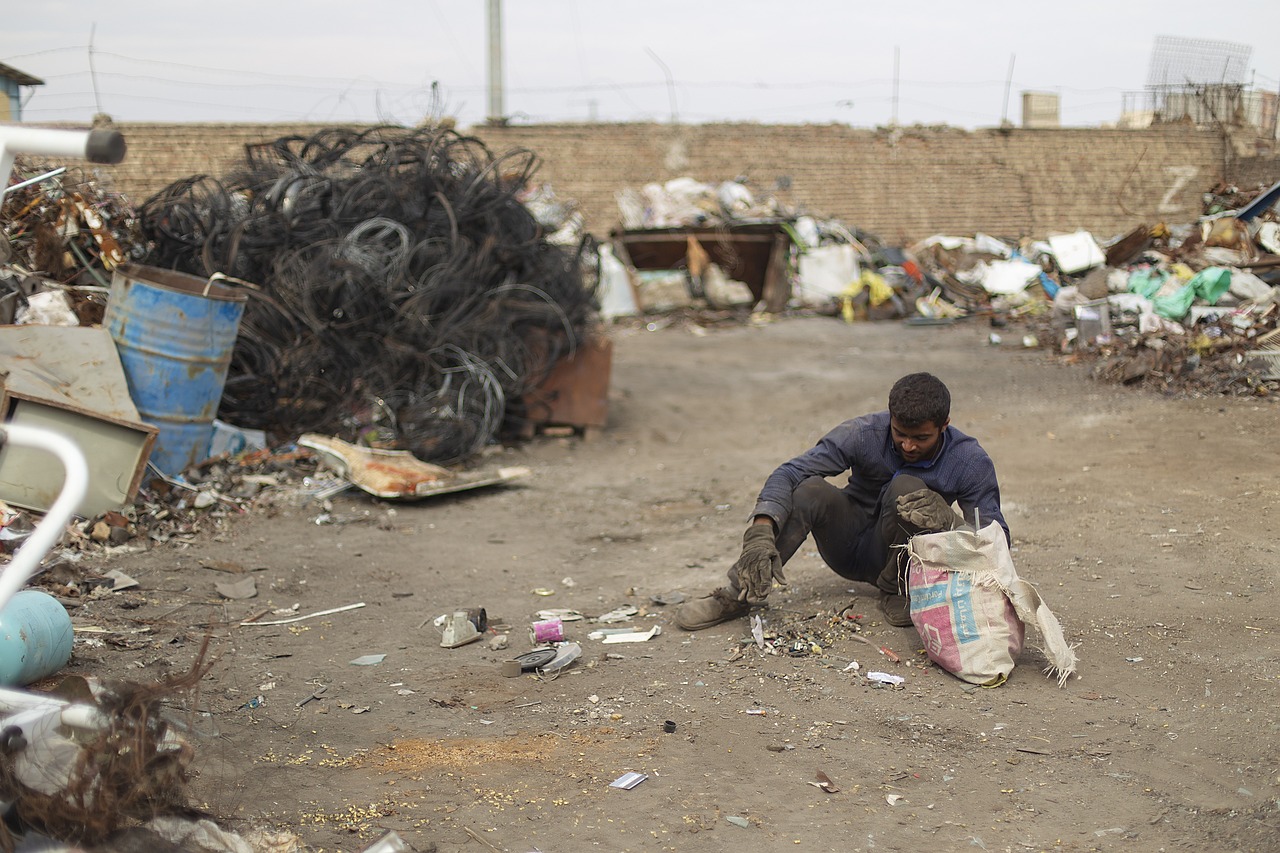
Environmental Impact
When we think about the environmental impact of waste, it’s easy to feel overwhelmed. Landfills are not just mountains of trash; they're ticking time bombs of pollution. Every piece of waste that ends up in a landfill contributes to a cascade of negative effects on our planet. By adopting a zero waste philosophy, we can significantly reduce these impacts and pave the way for a healthier environment.
One of the most pressing issues with landfills is the production of greenhouse gases, particularly methane. Did you know that organic waste, when buried under layers of trash, breaks down anaerobically, releasing methane—a gas that is over 25 times more potent than carbon dioxide over a 100-year period? This means that every banana peel, every leftover meal, and every piece of yard waste that we toss into the trash is contributing to climate change. By achieving zero waste, we can divert organic materials from landfills and instead compost them, turning waste into a resource rather than a problem.
Moreover, landfills can leach harmful substances into our soil and groundwater. This leachate, a toxic soup of chemicals, can contaminate local water sources, posing risks to both human health and wildlife. The Environmental Protection Agency (EPA) has documented numerous cases where landfill leachate has caused significant environmental damage. By reducing the amount of waste sent to landfills, we can minimize these risks and protect our natural resources.
Zero waste practices also promote biodiversity. When we reduce landfill contributions, we help preserve ecosystems that might otherwise be threatened by pollution and habitat destruction. For instance, recycling and reusing materials can lessen the need for new raw materials, which often leads to deforestation and the destruction of habitats. By shifting our focus from a linear economy—where we take, make, and dispose—to a circular economy, we can support the health of our planet and its inhabitants.
To visualize the impact of achieving zero waste, consider the following table that highlights the potential reductions in environmental harm:
| Impact Area | Current Situation | With Zero Waste |
|---|---|---|
| Greenhouse Gas Emissions | Over 20% of U.S. emissions from landfills | Significant reduction, targeting net-zero emissions |
| Soil and Water Contamination | Leachate affecting local ecosystems | Healthier soil and cleaner water sources |
| Biodiversity | Habitat loss due to landfill expansion | Preserved habitats and enhanced biodiversity |
In conclusion, the environmental impact of waste is profound, but by striving for zero waste, we can turn the tide. Fostering a culture of sustainability not only benefits our planet but also enhances our quality of life. It’s about making conscious choices that ripple through our communities and beyond. So, the next time you’re about to toss something in the trash, ask yourself—could this be composted, reused, or recycled? Together, we can create a cleaner, greener future.
- What is zero waste? Zero waste is a philosophy that encourages the redesign of resource life cycles so that all products are reused. It aims to eliminate waste by ensuring that all materials are recycled or composted.
- How can individuals contribute to zero waste? Individuals can contribute by reducing consumption, reusing items, composting organic waste, and recycling materials whenever possible.
- What are the economic benefits of zero waste? Zero waste can lead to cost savings, job creation in recycling and composting sectors, and stimulate innovation in sustainable practices.

Community Health
When we talk about , we often think of access to healthcare services, clean air, and safe drinking water. But did you know that the amount of waste we generate plays a critical role in the overall health of our communities? Landfills are not just unsightly; they are breeding grounds for harmful pollutants that can seep into the air and water, affecting everyone nearby. By striving for a zero waste approach, we can significantly improve the quality of life for residents and create a healthier environment for future generations.
Imagine a community where the air is crisp, the parks are clean, and the water is pure. This vision is achievable through effective waste management strategies that prioritize reduction, reuse, and recycling. When we divert waste from landfills, we reduce the risk of soil and water contamination, which can lead to severe health issues such as respiratory problems, allergies, and even chronic diseases. Studies have shown that areas near landfills often report higher incidences of health problems. By minimizing waste, we can mitigate these risks and foster a healthier living environment.
Moreover, zero waste initiatives promote community engagement and education, leading to a collective effort in environmental stewardship. When residents are educated about the impact of waste on their health, they become more motivated to participate in recycling programs and community clean-ups. This not only helps in reducing waste but also strengthens community bonds as people come together for a common cause.
Here are a few key health benefits associated with achieving zero waste:
- Improved Air Quality: Reducing waste can lead to fewer emissions from waste incineration and trucks transporting garbage, resulting in cleaner air.
- Cleaner Water Sources: With less waste ending up in landfills, we can prevent harmful leachate from contaminating groundwater.
- Enhanced Mental Well-being: A clean environment contributes to better mental health, reducing stress and promoting a sense of community pride.
In summary, achieving zero waste is not just an environmental goal; it is a public health imperative. By taking steps to reduce waste, we create cleaner, safer, and healthier communities. It’s time to rethink our waste management strategies and embrace a future where our communities flourish without the burden of landfill waste.
1. What is zero waste?
Zero waste is a philosophy that encourages the redesign of resource life cycles so that all products are reused, and waste is minimized. It aims to close the loop through greater recycling and composting.
2. How does zero waste impact community health?
By reducing landfill waste, communities can lower pollution levels, improve air and water quality, and enhance overall public health outcomes.
3. What are some ways to get involved in zero waste initiatives?
You can participate in local recycling programs, attend community clean-up events, or advocate for policies that promote waste reduction.

Resource Conservation
Resource conservation is at the heart of the zero waste movement, representing a fundamental shift in how we view materials and their lifecycle. Instead of treating waste as an inevitable byproduct of consumption, we can reframe our perspective to see it as a valuable resource. This approach not only minimizes landfill contributions but also promotes a circular economy where materials are reused, recycled, or composted. Imagine a world where every item you discard has the potential to be transformed into something new, rather than simply being tossed away. This is the essence of resource conservation.
One of the most significant benefits of adopting zero waste practices is the efficient use of natural resources. By reusing materials, we can dramatically reduce the demand for new production, which in turn lessens the strain on our planet's finite resources. For instance, consider the production of aluminum cans. Recycling aluminum saves up to 95% of the energy required to create new cans from raw materials. This kind of energy conservation is crucial as we face the challenges of climate change and resource depletion.
Moreover, resource conservation fosters innovation. Businesses that embrace zero waste principles often find themselves at the forefront of creative solutions. They develop new products from recycled materials, which can lead to the emergence of entirely new markets and job opportunities. For example, companies are now producing clothing from recycled plastics, turning what was once waste into fashionable apparel. This not only conserves resources but also addresses the growing issue of plastic pollution.
To illustrate the impact of resource conservation, let’s take a look at a few statistics:
| Material | Recycling Rate | Energy Saved (%) |
|---|---|---|
| Aluminum | 75% | 95% |
| Glass | 33% | 30% |
| Paper | 66% | 40% |
As we can see from the table, recycling not only reduces the amount of waste sent to landfills but also conserves significant amounts of energy. This is a win-win scenario for both the environment and the economy. By embracing resource conservation, we can build a more sustainable future, one where we respect our planet's limits and work within them.
In conclusion, resource conservation through zero waste practices is not just beneficial; it is essential. It offers a pathway to a sustainable future that reduces our ecological footprint while promoting economic growth and innovation. By changing our mindset and embracing the potential of materials, we can create a healthier planet for generations to come.
- What is zero waste? Zero waste is a philosophy aimed at minimizing waste production by reusing, recycling, and composting materials instead of sending them to landfills.
- How can individuals contribute to zero waste? Individuals can contribute by reducing single-use plastics, composting organic waste, and supporting businesses that prioritize sustainability.
- What are the economic benefits of zero waste? Zero waste can lead to cost savings, job creation in recycling and composting sectors, and innovation in sustainable products.
- How does zero waste impact community health? Reducing waste leads to cleaner air and water, which can significantly improve public health outcomes.

Economic Advantages
Transitioning to a zero waste model isn't just an environmental imperative; it also brings a plethora of that can benefit communities and businesses alike. Imagine a world where waste is minimized, resources are maximized, and economic growth is sustainable. This is not just a dream but a tangible reality that can be achieved through effective waste management strategies. By embracing zero waste practices, communities can not only save money but also create jobs and stimulate innovation.
One of the most compelling economic benefits of achieving zero waste is the potential for cost savings. When businesses reduce the amount of waste they generate, they often find themselves spending less on waste disposal and management. This can free up funds that can be reinvested into the business or community, leading to further growth and development. For instance, companies that adopt recycling programs can significantly lower their waste management costs while simultaneously creating new revenue streams from selling recyclable materials. This recycling revolution can be seen in various sectors, from manufacturing to retail, where waste is transformed into profit.
Moreover, the shift towards zero waste can lead to the creation of new jobs, particularly in the recycling and composting industries. As communities and businesses seek to implement zero waste practices, there will be an increased demand for skilled workers who can manage recycling programs, operate composting facilities, and educate the public about waste reduction. According to recent studies, the recycling industry alone has been shown to create more jobs per ton of waste processed compared to traditional waste disposal methods. This means that as we move towards a zero waste future, we can expect to see a boom in employment opportunities that not only help the economy but also contribute to a healthier planet.
Additionally, innovation plays a crucial role in the economic advantages of zero waste. As businesses and communities strive to reduce waste, they often find themselves thinking outside the box, leading to the development of new technologies and processes. For example, companies may invest in advanced recycling technologies or sustainable product designs that minimize waste during production. This kind of innovation not only enhances the competitiveness of businesses but also fosters a culture of sustainability that can inspire others to follow suit.
In summary, the economic advantages of achieving zero waste are clear. From significant cost savings and job creation to stimulating innovation, the transition to a zero waste model can have a profound impact on both local and national economies. As we embrace this philosophy, we pave the way for a more sustainable and prosperous future, proving that protecting our planet and enhancing our economy can go hand in hand.
- What is zero waste? Zero waste is a philosophy that encourages the redesign of resource life cycles so that all products are reused, and waste is minimized.
- How can communities achieve zero waste? Communities can achieve zero waste through education, recycling programs, composting initiatives, and by encouraging businesses to adopt sustainable practices.
- What are the environmental benefits of zero waste? Zero waste helps reduce landfill contributions, lowers greenhouse gas emissions, and protects ecosystems by minimizing pollution.
- Can zero waste be economically viable? Yes, zero waste can lead to cost savings, job creation, and innovation, making it economically advantageous for communities and businesses.
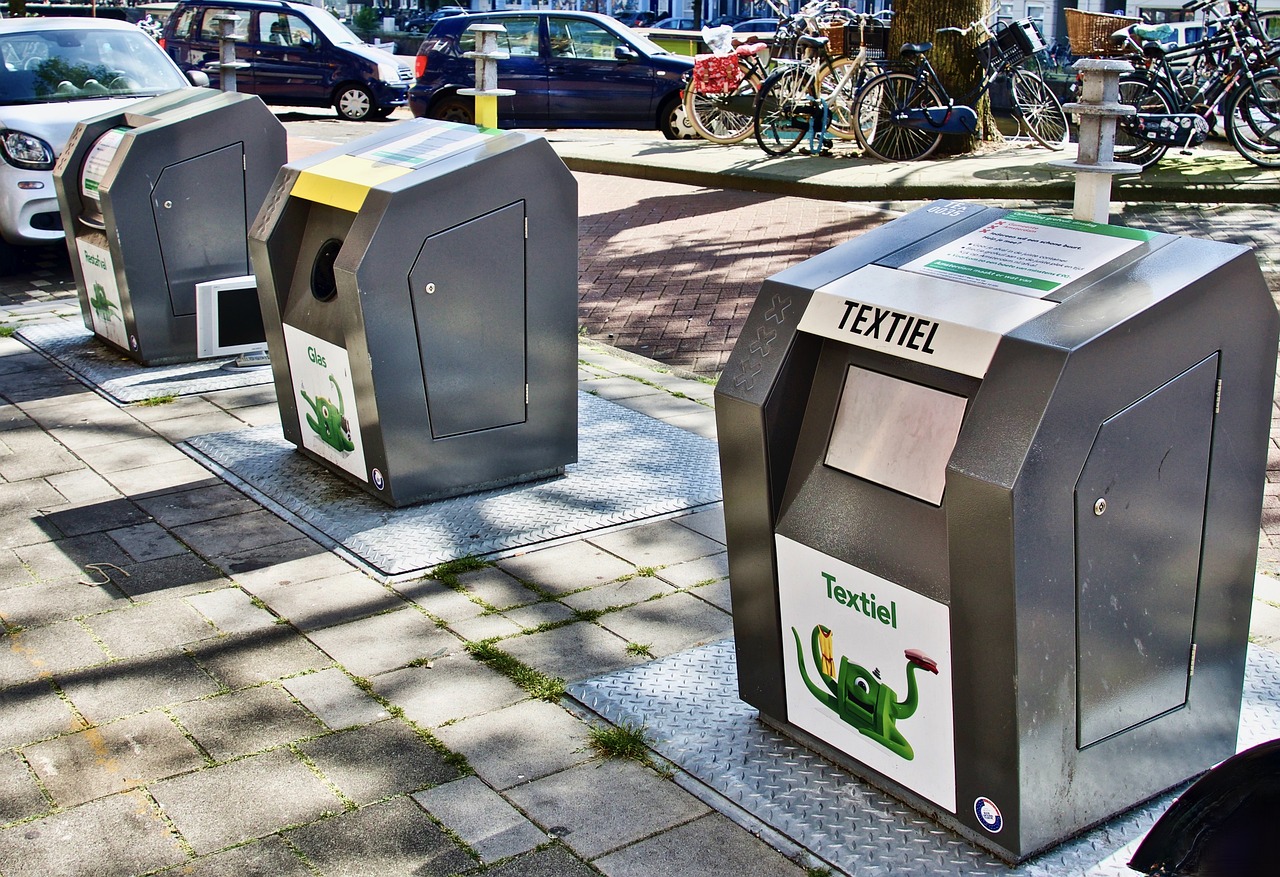
Strategies for Implementation
Implementing a zero waste strategy isn't just a lofty goal; it's a practical roadmap that communities and organizations can follow to significantly reduce their waste footprint. The journey to achieving zero waste begins with strategic planning and a collective commitment to sustainability. It’s like embarking on a road trip where everyone in the vehicle has a role to play, and without cooperation, you might find yourself stuck in traffic—or worse, lost! So, what are the essential strategies that can help pave the way for a successful zero waste initiative?
First and foremost, community engagement is crucial. Picture this: a neighborhood where everyone is excited about reducing waste. This enthusiasm can be contagious! Educational programs and outreach activities can foster a culture of sustainability, encouraging residents to adopt practices like composting, recycling, and mindful consumption. Workshops, local events, and even social media campaigns can serve as effective platforms for spreading awareness. When people understand the impact of their choices, they are more likely to participate actively in zero waste efforts.
Next, we have to consider the role of policy and legislation. Just like a well-structured play needs a script, successful zero waste initiatives require supportive policies. Local governments can implement regulations that promote waste reduction, such as bans on single-use plastics or incentives for businesses that adopt sustainable practices. Additionally, providing resources for waste management, such as accessible recycling bins and composting facilities, can make a significant difference. It’s about creating an environment where sustainability is not just encouraged but also facilitated.
Moreover, collaboration among different stakeholders is key. This includes partnerships between local governments, businesses, non-profits, and community groups. By working together, these entities can share resources, knowledge, and best practices. For instance, a local business might team up with a recycling organization to create a program that encourages customers to bring their own containers, thus reducing waste. This synergy can lead to innovative solutions and a stronger commitment to zero waste.
Additionally, measuring progress is vital in this journey. It’s essential to establish clear metrics that track waste generation and diversion rates. This data can help identify areas for improvement and celebrate successes. For example, if a community reduces its landfill contributions by 30% within a year, that’s a victory worth highlighting! Regular reports and updates can keep the momentum going and motivate individuals and organizations to stay engaged.
Finally, fostering a culture of innovation can significantly enhance zero waste efforts. Encouraging creativity and out-of-the-box thinking can lead to unique solutions that might not have been considered otherwise. For instance, local entrepreneurs can develop new products from recycled materials, or schools can create programs that teach students about sustainable practices. This not only helps in reducing waste but also inspires others to think differently about consumption and resource use.
In summary, achieving zero waste requires a multi-faceted approach that includes community engagement, supportive policies, collaboration, progress measurement, and a culture of innovation. Just as every drop in the ocean counts, every small action contributes to a larger impact. With determination and teamwork, we can turn the dream of zero waste into a tangible reality!
- What is zero waste? Zero waste is a philosophy that encourages the redesign of resource life cycles so that all products are reused, and no waste is sent to landfills.
- How can I start reducing waste in my home? Begin by assessing your waste habits, implementing recycling and composting, and reducing single-use items.
- Are there any financial benefits to going zero waste? Yes! Reducing waste can lead to significant cost savings in disposal fees and can foster new business opportunities.
- How can communities work together to achieve zero waste? Communities can collaborate through local initiatives, educational programs, and by supporting local businesses that prioritize sustainability.

Community Engagement
Successful zero waste initiatives are not just about implementing policies or installing recycling bins; they are fundamentally rooted in . Imagine a neighborhood where everyone is actively participating in waste reduction efforts. This vision can become a reality when communities come together, share knowledge, and support one another in their journey towards sustainability. But how do we foster this sense of community? It begins with education and outreach.
Education is the cornerstone of community engagement. When individuals understand the impact of their waste on the environment, they are more likely to change their habits. Workshops, seminars, and community events can serve as platforms for spreading awareness about waste management techniques like composting, recycling, and upcycling. For example, organizing a community workshop on composting can empower residents to turn their kitchen scraps into nutrient-rich soil, reducing the amount of organic waste sent to landfills.
Moreover, outreach programs can be tailored to target specific demographics within the community. Engaging with schools, local businesses, and community centers can help reach a broader audience. By collaborating with schools, we can instill sustainable practices in children from a young age, ensuring that the next generation is equipped with the knowledge and skills to continue the fight against waste. Local businesses can also play a pivotal role; by adopting zero waste practices and sharing their success stories, they can inspire others to follow suit.
Another vital aspect of community engagement is creating opportunities for participation. This can include organizing clean-up days, recycling drives, or even establishing community gardens. These activities not only help reduce waste but also foster a sense of belonging and pride among participants. When people see the tangible results of their efforts, such as a cleaner park or a thriving garden, it reinforces their commitment to the zero waste movement.
To further enhance community engagement, it’s essential to create a feedback loop. This means encouraging residents to share their experiences and suggestions regarding waste management initiatives. An effective way to do this is through surveys or community meetings where everyone can voice their opinions. This feedback not only helps to improve existing programs but also makes community members feel valued and heard.
In conclusion, community engagement is a critical component of achieving zero waste. By educating residents, fostering participation, and creating a platform for feedback, communities can work collaboratively towards a sustainable future. After all, when it comes to waste reduction, we’re all in this together, and every small action contributes to a much larger impact.
- What is zero waste? Zero waste is a philosophy that encourages the redesign of resource life cycles so that all products are reused, and no waste is sent to landfills or incinerators.
- How can I get involved in zero waste initiatives? You can start by participating in local clean-up events, educating yourself and others about waste reduction, and advocating for sustainable practices in your community.
- What are some simple steps to reduce waste at home? Begin by reducing single-use plastics, composting organic waste, and recycling materials whenever possible. Small changes can lead to significant impacts!

Policy and Legislation
When it comes to achieving zero waste, the role of cannot be overstated. Governments at all levels have the power to shape waste management practices through regulations that encourage sustainability and discourage wasteful behaviors. Think of it as the backbone of a thriving zero waste initiative—without it, the entire structure can collapse under the weight of outdated practices. So, what does effective policy look like in the context of zero waste?
First and foremost, legislation should focus on reducing waste at the source. This means implementing policies that promote sustainable production methods, such as requiring manufacturers to design products with longer lifespans and recyclability in mind. For instance, some regions have enacted laws that mandate the use of biodegradable materials in packaging, which significantly reduces the volume of waste that ends up in landfills. By incentivizing companies to adopt eco-friendly practices, governments can help create a culture of sustainability that resonates throughout the community.
Additionally, financial incentives play a crucial role in encouraging businesses and individuals to participate in zero waste initiatives. These incentives can come in various forms, including tax breaks for companies that implement recycling programs or grants for local governments to invest in composting facilities. A well-structured incentive program can lead to a win-win situation where both the environment and the economy benefit. For example, consider a city that offers subsidies for composting systems; not only does this reduce landfill waste, but it also creates jobs in the green sector, fostering local economic growth.
Moreover, effective waste management policies should include public education campaigns that raise awareness about the importance of reducing waste. When people understand the impact of their choices, they are more likely to adopt sustainable practices. Policies that support educational initiatives can empower communities to take action, whether it’s through workshops on composting or school programs that teach children about recycling. As the saying goes, "knowledge is power," and in this case, it’s the power to change behaviors for the better.
To illustrate the impact of policy and legislation on zero waste, let’s take a look at a few successful examples:
| Location | Policy/Legislation | Outcome |
|---|---|---|
| San Francisco, USA | Mandatory recycling and composting | Achieved over 80% diversion from landfills |
| Kamikatsu, Japan | Zero waste town initiative | Reduced waste by 80% in a decade |
| Capannori, Italy | Pay-as-you-throw waste management | Cut waste production by 30% in two years |
In conclusion, the journey to zero waste is not just a grassroots movement; it requires robust policies and legislation that support sustainable practices. By creating a framework that encourages waste reduction, incentivizes eco-friendly behaviors, and educates the public, governments can lead the charge toward a more sustainable future. The question remains: are we ready to embrace these changes and make zero waste a reality?
- What is zero waste? Zero waste is a philosophy that encourages the redesign of resource life cycles so that all products are reused, and no waste is sent to landfills.
- How can individuals contribute to zero waste? Individuals can contribute by reducing their consumption, reusing items, recycling, and composting organic waste.
- What are some examples of zero waste practices? Examples include using reusable bags, buying in bulk, composting food scraps, and choosing products with minimal packaging.
- Why is policy important for zero waste? Policies provide the framework and support needed for communities and businesses to adopt sustainable practices and reduce waste effectively.
Frequently Asked Questions
- What does zero waste to landfills mean?
Zero waste to landfills is a philosophy and strategy aimed at reducing the amount of waste sent to landfills. It focuses on minimizing waste generation, maximizing recycling and composting, and ultimately striving for a sustainable approach to resource management.
- Is it really possible to achieve zero waste?
While achieving absolute zero waste may be challenging, many communities and organizations have successfully implemented strategies that significantly reduce landfill contributions. It's about making continuous improvements and engaging everyone in the process!
- What are the main benefits of adopting a zero waste approach?
There are numerous benefits, including environmental protection, resource conservation, and economic savings. By reducing waste, we can lower pollution levels, conserve natural resources, and even create jobs in recycling and composting sectors!
- How does zero waste impact community health?
Reducing waste can lead to cleaner air and water, which significantly improves public health outcomes. Fewer landfills mean fewer harmful emissions and pollutants, creating a healthier environment for everyone.
- What strategies can individuals use to reduce waste?
Individuals can adopt simple practices like recycling, composting, and reducing single-use items. Engaging in community initiatives and spreading awareness can also make a big difference in promoting a zero waste lifestyle!
- How important is community involvement in zero waste initiatives?
Community engagement is crucial! Successful zero waste initiatives rely on participation from residents, businesses, and local organizations. Education and outreach can foster a culture of sustainability, making everyone a part of the solution.
- What role do government policies play in achieving zero waste?
Government policies are essential in promoting zero waste. Regulations and incentives can support waste reduction efforts, making it easier for communities to adopt sustainable practices and achieve their waste reduction goals.
- Can zero waste practices save money?
Absolutely! Transitioning to zero waste can lead to significant cost savings by reducing waste disposal fees, lowering material costs through reuse, and creating jobs in the recycling and composting industries.

